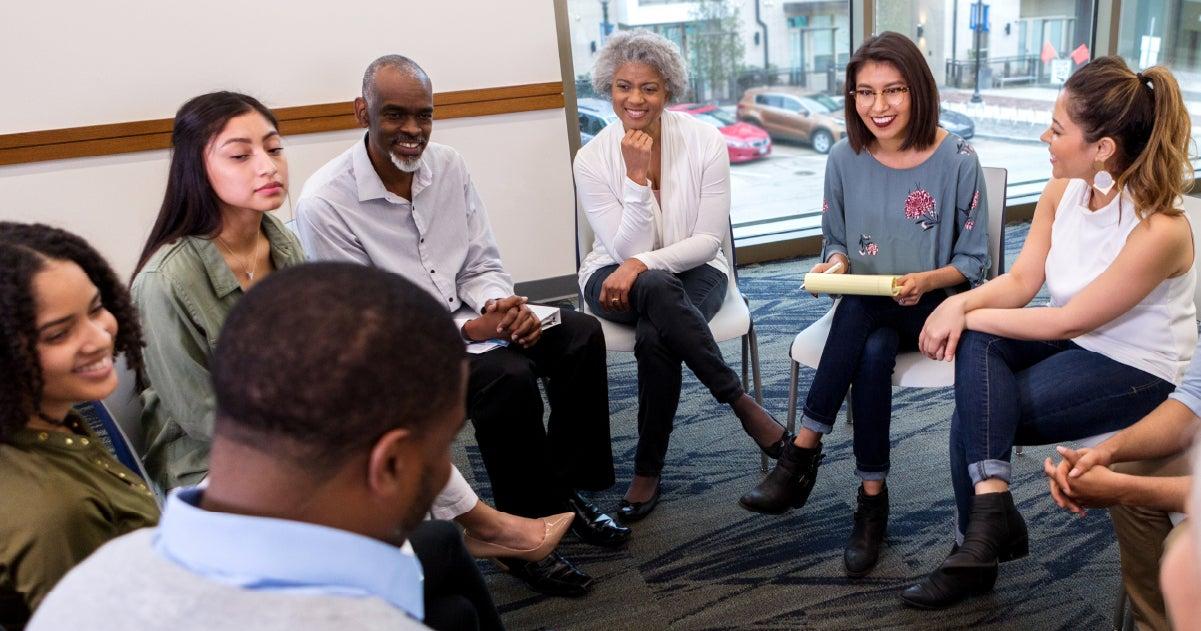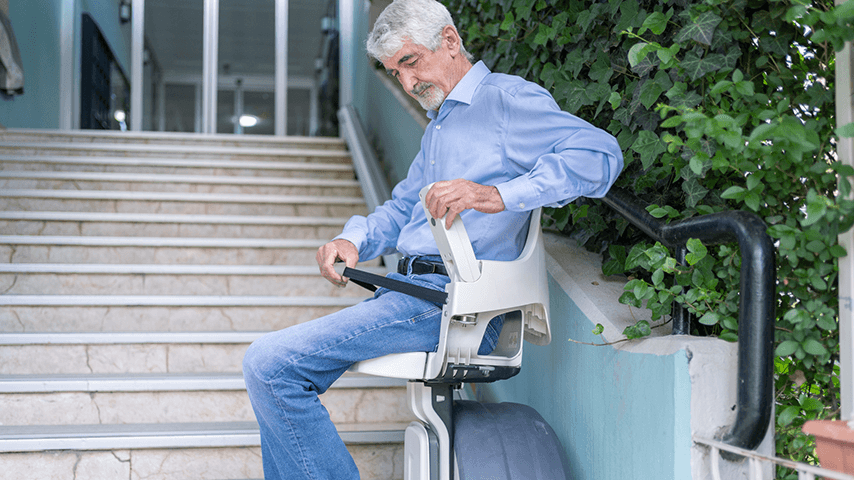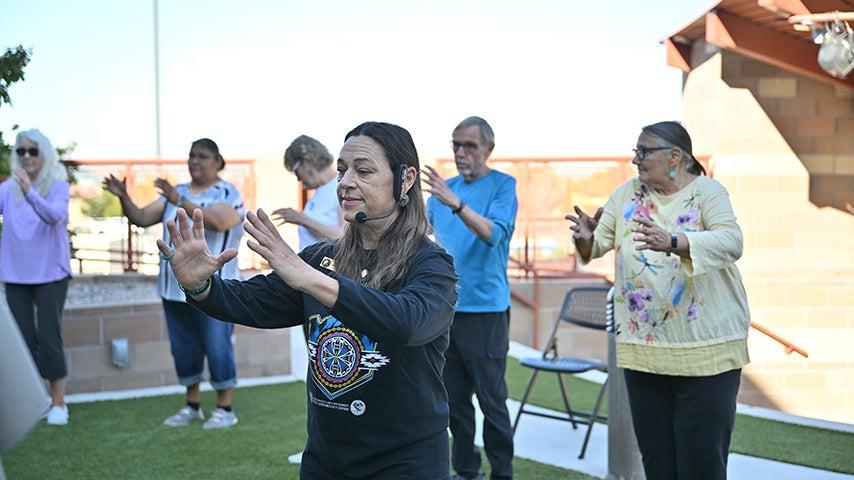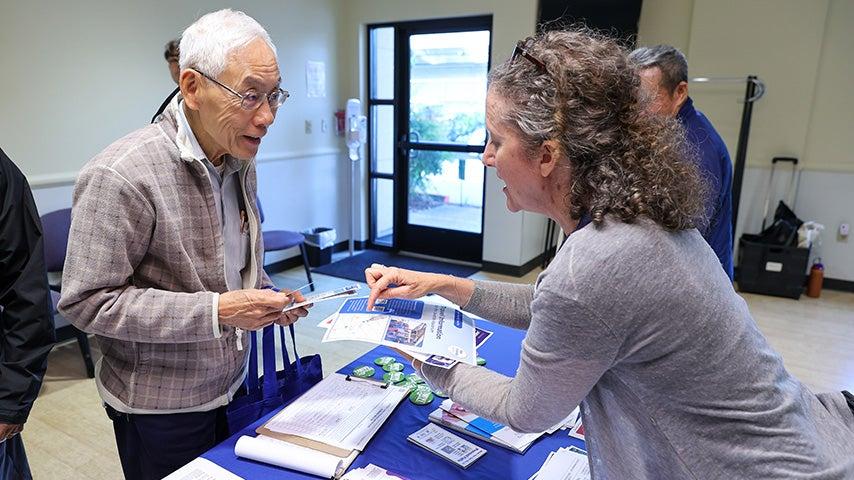
Related Topics
The goal of the ACL/NCOA National Falls Prevention Fellowship Program is to cultivate leaders who will explore research and champion systems change solutions focused on mitigating older adult falls, falls risk factors, and fall-related injuries to reduce the personal and financial costs of older adult falls and improve the lives of older adults.
Meet the 2025 National Falls Prevention Fellows
Maggie Conners Deforge, OTD, OTR/L
Doctor of Occupational Therapy, Saint Regis Mohawk Tribe Health Services, Akwesasne, New York
Fellowship focus: Pending approval by her Tribal Council, Maggie's project aims to reduce falls and support Elders' autonomy by improving the coordination, delivery, and knowledge of services related to falls prevention on her reservation. She plans to create a falls prevention and response needs assessment process that is culturally safe, community-led, participatory, and easily replicable/scalable to other Indigenous communities.
Kristi L. Ladowski, MPH, PhD Candidate
Associate Director, Injury Prevention Outreach and Clinical Integration, Stony Brook Medicine, New York
Fellowship Focus: Ladowski is testing an innovative approach to expand access to evidence-based Fall Prevention programs. Using the PRISM and RE-AIM dissemination and implementation frameworks, this project will evaluate whether a flexible, collaborative (Flex-Collab) virtual delivery model can overcome barriers such as rigid scheduling, travel limitations, and instructor shortages, while maintaining fidelity and promoting long-term engagement. Specifically, this project will describe the development of an innovative Flex-Collab virtual tai chi program model designed to address critical gaps in research to practice and evaluate the impact on program outcomes compared to traditional closed-cohort delivery program models. The project aims to generate practical, scalable strategies that improve availability, equity, and sustainability of fall-prevention programs for older adults. Ladowski will develop a Fidelity & Measurement Map tying PRISM domains to RE-AIM outcomes that may support evaluation and adaptions of other health promotion interventions.
Meet the 2024 National Falls Prevention Fellows
Jessica J. Bolduc, DrOT, MSOTR/L, FAOTA
Healthy Aging Program Manager within Community Health Improvement, MaineHealth, Portland, Maine
Fellowship focus: Bolduc will pilot strategies that bolster falls prevention education for care team members and older adult patients to improve falls risk screening during Medicare Annual Wellness Visits and establish outcome measures and reimbursement frameworks to incentivize falls prevention actions within healthcare systems and the community. She will develop policy initiatives to advocate for improved screening and reimbursement strategies and program structures.
Samantha Morigeau, PT, DPT
Outpatient Doctor of Physical Therapy and Falls Prevention Specialist with the Confederated Salish and Kootenai Tribes Tribal Health Department, Polson, Montana
Fellowship focus: Morigeau’s project aims to empower Native American elders and community leaders to address falls risks in their rural communities. She will engage the community to identify social and environmental factors that contribute to falls risk, analyze findings, and create strategies to guide the implementation of culturally tailored interventions and inform policies.
Shary Perez Torres, MPH, DrPH Student
Community Health and Research Program Coordinator, United Community Center, Milwaukee
Fellowship focus: Perez Torres will evaluate Wisconsin’s surveillance systems that track the usage of older adult falls prevention initiatives to understand the data they collect and their responsiveness to the needs of Latino communities. She will interview Latino older adults, caregivers, and providers for their perspectives, and develop recommendations for tracking systems that inform program delivery in Latino communities, serving as a model for replication with other populations.
Padraic Stanley, MSW, LCSW
Program Manager of Community Integration, Department of Social Work & Community Health, Rush University Medical Center, Chicago
Fellowship focus: Stanley will conduct research by analyzing state-level emergency department and hospitalization data; nationwide data on evidence-based falls prevention program dissemination; and perform qualitative research with older adults and people with disabilities who have fallen to explore the causes. Based on his findings, he will engage stakeholders to develop solutions and guidance for program dissemination.
What are the objectives of the National Falls Prevention Fellowship Program?
- Increase and enhance leadership in falls prevention
- Increase fellows' knowledge and skills in falls prevention policy, service delivery, and research
- Produce novel practices and systems change solutions that address gaps in knowledge and barriers to reducing falls, falls risk factors, and fall-related injuries among older adults
What is the National Falls Prevention Fellowship Program?
The National Falls Prevention Fellowship Program aims to cultivate leaders in the falls prevention network. Up to four fellows will each be awarded up to $50,000 to conduct a policy, research, and/or programmatic project that addresses systemic barriers to preventing falls. Fellows will be selected based on their: experience; commitment to falls prevention issues; leadership potential; and interest in systems change approaches to reduce falls, falls risk factors, and fall-related injuries, aiming to improve the lives of older adults and reduce the personal and financial costs of older adult falls. The fellowship program has an interdisciplinary focus.
Core components of the year-long fellowship will include: engagement with a broad range of national experts from public, private, and non-profit sectors to foster collaboration across varied sectors; development opportunities to enhance fellows’ knowledge around key falls prevention and related issues; mentorship to develop leadership skills and build knowledge and skills that support fellows’ career goals and enhance their ability to affect change; and monthly meetings with the NCOA Policy and Advocacy Team to provide insight into the policymaking process and regulations that impact health and social care concerning falls and injury prevention, aiming to foster systems change approaches and solutions that reduce falls among older adults in the U.S.
Fellows will create a fellowship plan and individualized learning objectives in collaboration with NCOA to ensure that the fellowship experience supports their current and long-term goals. NCOA will review these plans with each fellow during regular meetings throughout the program to identify areas for assistance as needed.
Fellows will develop and implement a capstone project that identifies and addresses a barrier, problem, or need related to falls among older adults and is designed to have long-term impact and significant contributions to the field. These projects may vary in topic, but all will share the theme of systems change approaches to reduce falls, falls risk factors, and fall-related injuries. They should demonstrate the potential to impact policy, contribute knowledge, build partnerships, develop solutions, and/or identify collaborative strategies encompassing clinical, community, and technological interventions to advance the recognition and management of older adult falls as a chronic condition. Capstone projects may include studies, practical experience at regulatory agencies and/or organizations, workshops, public lectures, or other professional experiences. Capstone project topics will be determined by each fellow in collaboration with NCOA, ACL, and the Fellowship Advisory Committee.
Fellows will present their capstone project plans at NCOA’s National Falls Prevention Summit, Sept. 9-10 in Arlington, Virginia, and submit a paper to a peer reviewed journal on the capstone project process and/or findings.
Will another opportunity like this be available next year?
It has not yet been determined if funding will be available to support another fellowship opportunity.
How does NCOA work in falls prevention?
NCOA is funded by the Administration for Community Living (ACL) to lead the National Falls Prevention Resource Center. The National Falls Prevention Resource Center (NFPRC) provides leadership, guidance, and technical assistance to the falls prevention network of partners, including ACL-funded Falls Prevention grantees, state and local aging and public health agencies, and community-based organizations to increase public awareness about the risk of falls and how to prevent them.
The Resource Center also serves as a national clearinghouse to highlight and share best practices, resources, and information on evidence-based falls prevention programs and other evidence-based programs and practices.
The Fellowship Program will support the mission and efforts of the National Falls Prevention Resource Center by exploring gaps in service and barriers to service delivery, identifying solutions, and advancing systems change approaches to address the barriers that many providers encounter in their work to support the health, safety, and independence of the older adults they serve.
Please email healthyaging@ncoa.org with any questions regarding the National Falls Prevention Fellowship program opportunity.


